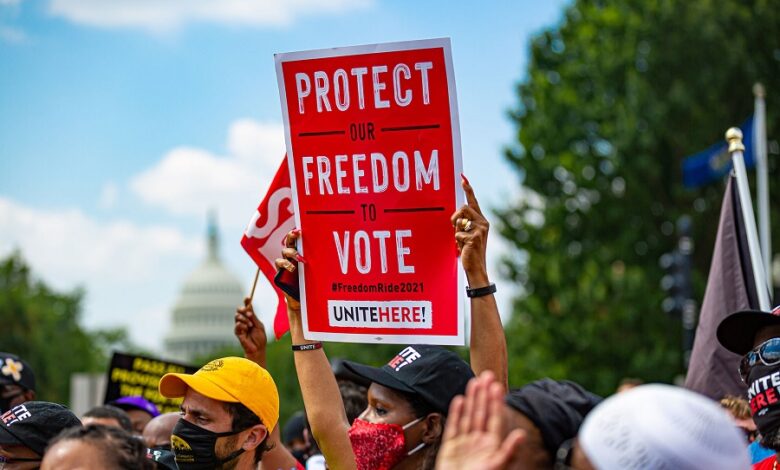What is the Freedom to Vote Act?

The Freedom to Vote Act stands as a pivotal piece of legislation in the United States Congress, aiming to bolster and protect voting rights while addressing campaign finance reform and curbing partisan gerrymandering. Introduced on September 14, 2021, by a bipartisan group of senators, the bill represents a revised version of the For the People Act (H.R. 1/S. 1), which faced a Republican filibuster in June 2021.
Encompassing four main areas—voting access, election security, redistricting, and campaign finance—the Freedom to Vote Act outlines significant provisions designed to fortify the democratic process in the United States.
Key provisions of the bill include:
Voting Access: The bill mandates states to provide at least 14 days of early voting, permit no-excuse mail voting, offer same-day voter registration, and implement automatic voter registration. Additionally, it prohibits states from imposing stringent voter ID laws, purging eligible voters from registration rolls, or limiting access to ballot drop boxes or mail voting options.
Election Security: The legislation requires the use of paper ballots and post-election audits for federal elections. It allocates funding and grants to states to upgrade election infrastructure, bolster cybersecurity measures, and counter foreign interference.
Redistricting: The bill prohibits partisan gerrymandering for congressional districts and mandates states to establish independent redistricting commissions to ensure the creation of fair and transparent electoral maps. It sets criteria for redistricting, emphasizing the preservation of communities of interest, racial and ethnic minorities, and political subdivisions.
Campaign Finance: Strengthening disclosure requirements for political spending, particularly by dark money groups and foreign entities, is a cornerstone of the legislation. It introduces a small-donor matching system for congressional and presidential candidates who agree to limit fundraising from large donors and empowers the Federal Election Commission to enforce campaign finance laws more rigorously.
The Freedom to Vote Act has garnered widespread support from civil rights organizations, voting rights advocates, labor unions, environmental groups, faith-based communities, and some Republican and independent leaders. Proponents hail it as a historic and comprehensive measure to safeguard American democracy against threats to voting rights and electoral integrity.
However, the bill faces opposition from certain Republican senators and conservative groups, who argue that it constitutes a federal overreach into state elections, a partisan power grab, or a violation of constitutional principles. As the legislation navigates through the Senate, it requires at least 60 votes to overcome a filibuster and proceed to a final vote.
The fate of the Freedom to Vote Act remains uncertain, but its significance in shaping the future of American democracy cannot be overstated. In a time of heightened polarization and challenges to democratic norms, the bill stands as a beacon of hope for ensuring the integrity and inclusivity of the electoral process.




